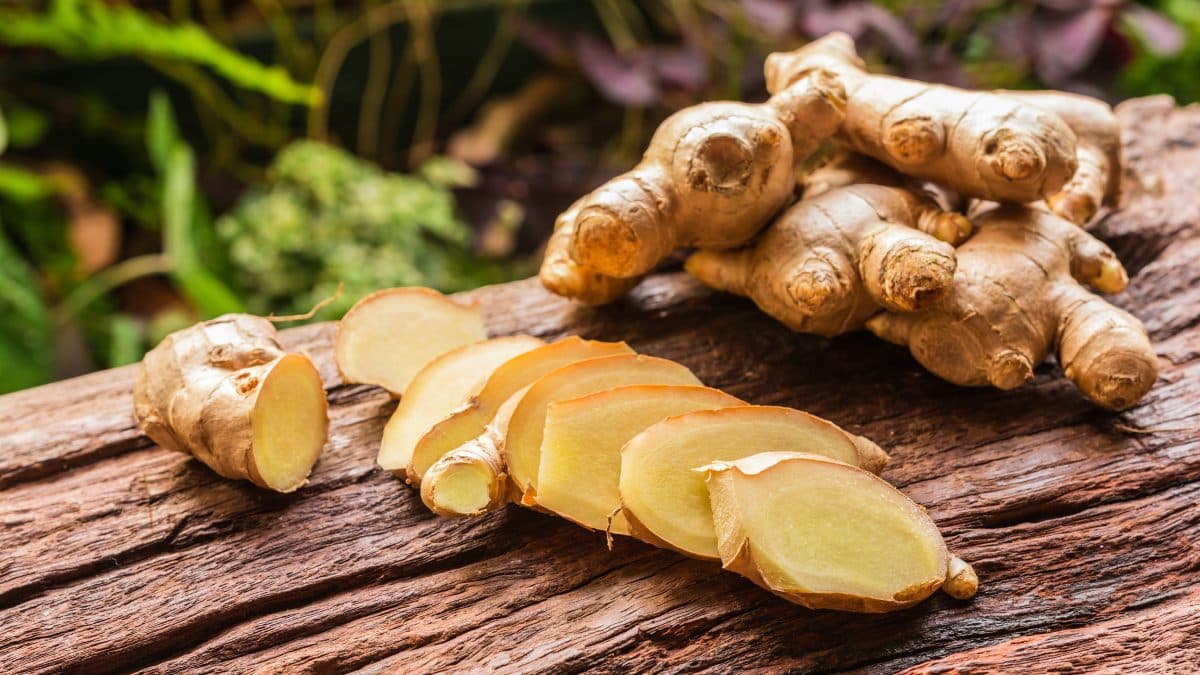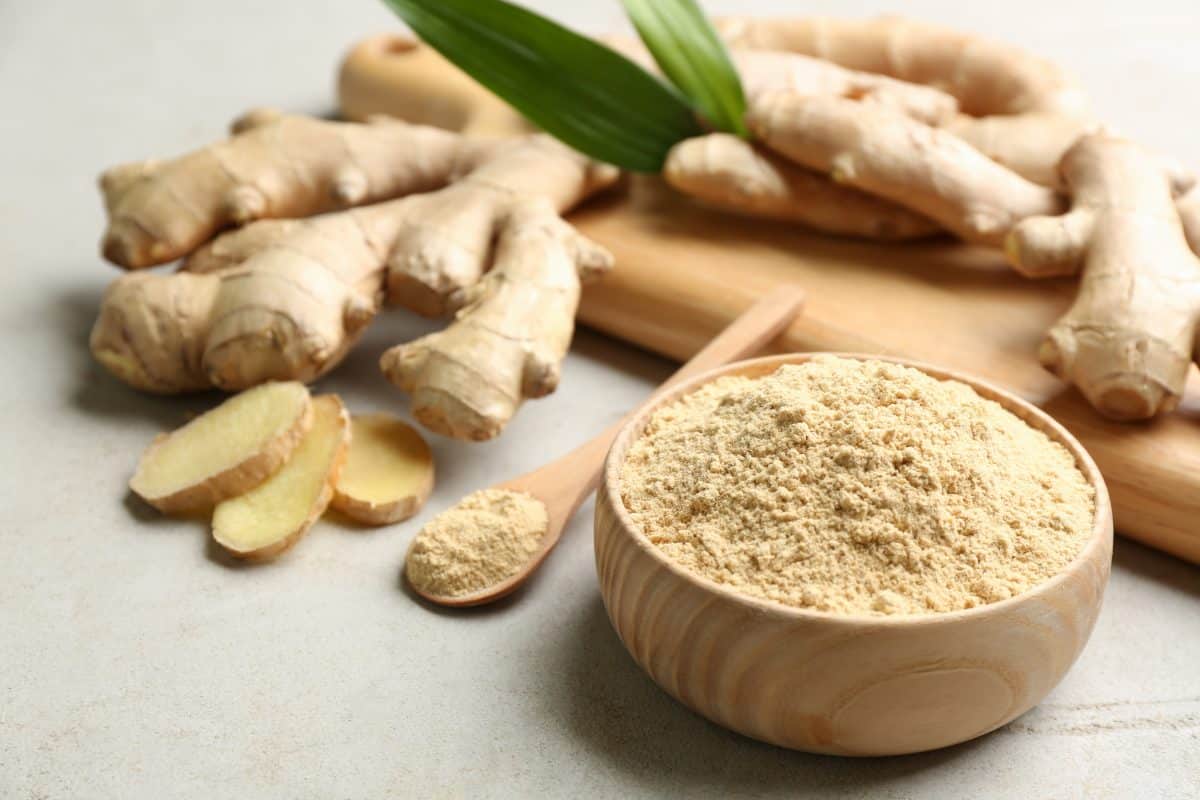Ginger FODMAPs: How to Incorporate Ginger in a low FODMAP Diet
- Low FODMAP diet
You might have wondered if ginger is low FODMAP? The answer is yes, ginger is low FODMAP.
Ginger is a popular ingredient in many cuisines and dishes, adding a strong and distinctive flavor.

What Is The Ginger FODMAP Content?
Monash University has tested the ginger FODMAP content and has found that ginger is FODMAP free (1).
Ginger typically comes in the form of ginger root or ground ginger.
Ginger root is fresh ginger typically peeled, sliced, chopped or grated depending on what you are cooking.
Whereas ground ginger comes in a container and can be easily measured using a teaspoon.
Only ginger root has been officially tested for its FODMAP content but as it contains no traces of FODMAPs, other forms of ginger are unlikely to be high FODMAP.
What Is Ginger?
Ginger, a root vegetable, comes from a flowering plant known as the Zingiber officinale, also known as the ginger plant, in SouthEast Asia.
It has complex flavors; warm, pungent, sweet, yet slightly spicy or fiery. Ginger also has a zesty and citrus element that helps to enhance the flavor of many dishes and cuisines.
Ginger has a soft, fibrous and stringy texture when fresh but becomes harder as it dries out.
For many years, ginger has been used in ancient remedies in Chinese and Indian medicine due to its extensive health benefits.
It is a versatile ingredient typically used in the following cuisines:
- Chinese
- Thai
- Japanese
- Korean
- Indian
- Caribbean
Ginger is also a popular addition to bakery items such as cakes, biscuits and bread due to its naturally intense flavor that can create a sweet taste within these products.
It also adds another depth of flavor and diversity to soups, marinades, sauces and dressings.
What Are The Health Benefits Of Ginger?
Ginger is an ingredient that offers many excellent health benefits, including helping to alleviate symptoms of nausea.
It may also help to relieve inflammation and feelings of pain.
Studies have found that those undergoing chemotherapy and who took a ginger supplement experienced fewer symptoms of nausea (2) (3).
Ginger supplementation in a dose of 1500mg has also been shown in many studies to help reduce feelings of nausea, vomiting and indigestion by aiding with gastric emptying (4, 5).
Ginger contains gingerol, a compound found in ginger which has anti-inflammatory properties.
Studies have found that ginger helps to reduce inflammation in the body and may help relieve pain resulting from osteoarthritis;
Two studies found that supplementing with 500mg of ginger powder for three months helped to reduce the number of inflammatory markers and reduce osteoarthritis induced inflammation in the body (6, 7).
Some research suggests that ginger may help with weight loss due to its ability to reduce inflammation within the body due to containing compounds known as gingerol, which help reduce the number of inflammatory products circulating within the body (8, 9).
Ginger has also been shown to help lower blood sugar levels, help to control your body’s response to insulin and lower LDL cholesterol (10, 11, 12).
There has also been some evidence that ginger may help to improve menstrual pain (13) (14) (15).
However, it may be no more effective at relieving pain than anti-inflammatory medication, such as aspirin or ibuprofen (16, 17, 18).

Ginger FODMAP Friendly Recipes
Ginger is a versatile ingredient that has a variety of uses. There are many great recipes that contain ginger that are also FODMAP friendly. We have included some recipes below:
Low FODMAP Gingersnap Cookies
Low-FODMAP Sheet Pan Asian Ginger and Lemon Chicken; Gluten-free, Dairy-free
Low FODMAP Sticky Cranberry Gingerbread
Low FODMAP Carrot-Ginger Soup
Orange Gingerbread Loaf
Ginger-Sesame Low FODMAP Meatballs
Carrot Ginger Dressing Salad
5-Ingredient Ginger Lime Tahini Salad Dressing (Low FODMAP)
Summary
Ginger is a root vegetable from the Zingiber officinale plant and has a low ginger FODMAP content.
It has a characteristically warm, pungent flavor and a slightly spicy and citrusy flavor that adds depth to a variety of dishes from many different cuisines.
Ginger has a variety of uses. It is often used in dishes, bakery items and in, soups, marinades, sauces and dressings.
It offers many health benefits, including reducing inflammation, relieving nausea and pain, assisting with weight loss, insulin regulation and lowering cholesterol.
Ginger is widely used and extremely tasty, with many delicious ginger FODMAP friendly recipes to try and enjoy.
Written by Georgina Taylor, reviewed by Kirsten Jackson, Consultant Dietitian BSc Hons, RD, PG Cert